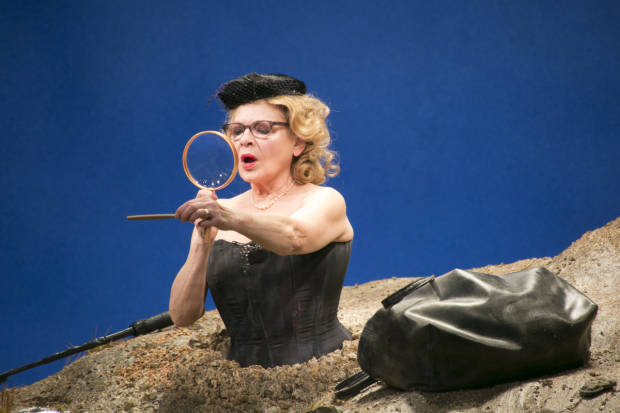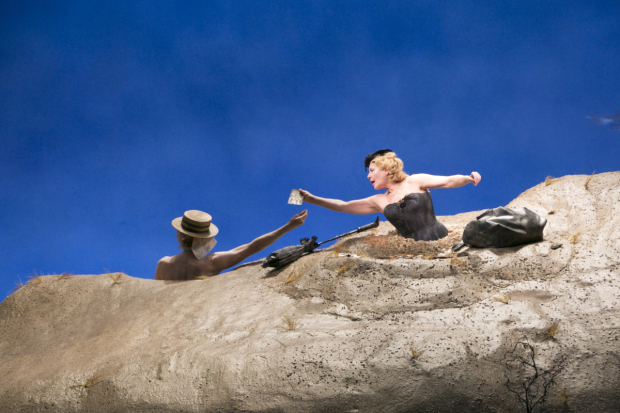Happy Days

(© Gerry Goodstein)
The characters in Samuel Beckett's plays tend to find themselves trapped in horribly absurd situations. That's especially true in his endlessly resonant Happy Days, in which the main character, Winnie, is rooted, quite literally, in the same spot as she passes the time tending to her everyday affairs. Despite Winnie's uncomfortable immobility, this notoriously demanding play (essentially a 100-minute monologue) has become an aspiration for many, including Ruth White, Fiona Shaw, and Brooke Adams.
Two-time Academy Award winner Dianne Wiest took on the challenging part last year at Yale Repertory Theatre and is now re-creating her marvelous performance, full of humor and pathos, at Brooklyn's Polonsky Shakespeare Center. Presented by Theatre for a New Audience, this Happy Days is not for the faint of heart. Director James Bundy lets Beckett's frequent stage pauses play themselves out, sometimes for a tad too long. Still, Wiest's humorous and poignant Winnie is one for the ages.
Bundy has given his production the feel of old-time theater. Before the play begins, we see a wood-paneled proscenium, a deep-red front curtain, and footlight shells that suggest a vaudeville performance. The theater, however, becomes solemn as the curtain rises to reveal a desolate slope (Izmir Ickbal's impressive set suggests a forgotten wasteland). There, a fiftyish Winnie is buried up to her waist in earth as she slumbers over a large handbag. Suddenly she's awakened by an obnoxiously loud alarm that gongs from the azure heavens (jarring sound design by Kate Marvin). "Begin your day, Winnie," she says to herself with wide eyes as the sun blazes above (effective lighting by Stephen Strawbridge). She brushes her teeth, applies lipstick, dons a modest hat, cleans her glasses with a handkerchief that she keeps tucked in her stiff black bodice (suggestively timeworn costumes by Alexae Visel), and occasionally calls to her sixtyish husband, Willie.

(© Gerry Goodstein)
It's another "happy day" for Winnie. Willie crawls around somewhere behind the mound and occasionally emerges with his back turned, rarely uttering a word. No matter. Winnie has a bag full of items to occupy her, including a revolver that she keeps close by. But as time passes, Winnie loses her ability to move and has only her own voice to pass the time, along with the sporadic appearances of Willie to provide her with the tiny glimmer of happiness that helps her go on.
Wiest beautifully conveys the quotidian drudgery and "great mercies" of Winnie's triumphs (deciphering the words on the handle of a toothbrush) and frustrations (chiding Willie for ogling a pornographic photo). During these moments, Bundy's slow pacing gives the audience time to ponder the rich, existential symbolism of Winnie's possessions — her handbag, magnifying glass, umbrella, brush, and that revolver. Jarlath Conroy's gruff portrayal of the henpecked Willie gets frequent laughs of recognition. Couples who have lived together many years will see themselves in this quirky onstage pair.
But it's the somber tone of this production that distinguishes it. Wiest infuses Winnie's solitary musings with a pensive skepticism, as though she suspects that her happiness may very well be nothing more than willful delusion. In those contemplative moments, Weist's cheerfully sad eyes express Winnie's aching desire simply to be seen by Willie, who keeps his back to her (and the audience) for the entire first act, his head covered by a filthy handkerchief and hat as he reads the want ads. Despite their infrequent interaction, Wiest and Conroy succeed in creating endearing chemistry onstage in marvelous moments of theater magic.
As the play progresses and time passes, though, Wiest, buried to her neck, shows us a Winnie whom we hardly recognize — her parched lips barely able to smile, her squinting eyes searching longingly for some vestige of her old self. But then comes Willie, stretching out his hand to her, and her eyes fill with hope once again.











